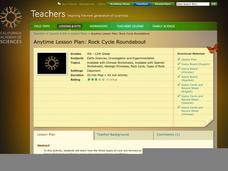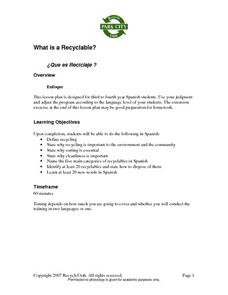California Academy of Science
Rock Cycle Roundabout
After a basic introduction to the rock cycle and the three main types of rocks, young geologists can deepen their understanding of how rocks change through a fun learning game. Based on the characteristics and events shared by a reader,...
K20 LEARN
No Imitations, Please! Avoiding Plagiarism
With all the stuff available online, good essays are just a click away. But talk about tracking! Writers beware! New tech can now identify plagiarism, and the consequences of presenting someone else's work as your own are severe. Here's...
Global Oneness Project
Highways and Change
What is the cost of change? Roberto Guerra's photo essay "La Carretera: Life and Change Along Peru's Interoceanic Highway" asks viewers to consider the impacts of the 1,600 mile-long highway through Peru and Brazil that connects Pacific...
Curated OER
The Spanish Omelet
High schoolers use analogies to show the relationships among cell, nucleus, genes, chromosome, ribosome, replication, mitosis, transcription, translation, DNA, RNA, amino acids and proteins, genotype, phenotype, and genetics vs....
Curated OER
HIV/AIDS in Our Spanish-Speaking Community and the World
Students study the HIV virus and how it has impacted the hispanic community. In this infectious disease lesson students discover how HIV/Aids is found all over the world, what misconceptions are out there and what kinds of treatments...
Curated OER
Beach Life: Spanish Banks Field Trip
Students discover beach life. In this beach life lesson, students visit a beach to find plant and animal species that live there. They discuss the life cycle and needs of some of these animals through a variety of activities.
Channel Islands Film
Once Upon a Time (Sa Hi Pa Ca): Lesson Plan 3
What was the most significant tool used by the Chumash? How did the environment make the tool possible? What group behaviors allowed the Chumash be be successful for thousands of years? After watching West of the West's documentary Once...
Curated OER
Making Regolith
You may not be able to take a field trip to the moon, but that doesn't mean your class can't study moon rocks. Using graham crackers as the moon's bedrock and powdered donuts as micrometeorites, young scientists simulate the creation of...
Curated OER
Get a Leg Up
Traveling through space is an amazing experience, but it definitely takes a toll on the body. After reading an article and watching a brief video, learners perform an experiment that simulates the effects of zero gravity on the human body.
Curated OER
Food for Spaceflight
When astronauts get hungry in outer space, they can't just call and have a pizza delivered. In order to gain an appreciation for the challenges associated with space travel, young learners are given the task of selecting, testing, and...
Curated OER
Designing a Crew Exploration Vehicle
Take your class on an out-of-this-world adventure with this fun engineering design lesson. Working in small groups, young scientists design, build, and test crew exploration vehicles using some creativity, teamwork, and an assortment of...
Baylor College
Food Webs
Explore various ecosystems from around the world as your class discovers the interdependence of all living things. Using the provided sets of ecosystem cards, young scientists work in small groups building food webs to demonstrate the...
Baylor College
Fossil Fuels and the Carbon Cycle
Humans are quickly depleting Earth's fossil fuels and locating them is becoming increasingly difficult! Layered muffins are used for models as young geologists take core samples in order to determine the presence of oil. Consider first...
Baylor College
Modeling Earth's Atmosphere
Life on Earth is made possible by the unique composition of its atmosphere. Working collaboratively, a scale model is created as young scientists learn about the different layers of gas that surround the planet. Cards are included that...
Baylor College
What Is the Water Cycle?
Small groups place sand and ice in a covered box, place the box in the sunlight, then observe as evaporation, condensation, and precipitation occur. These models serve as miniature water cycles and demonstrations of the three phases of...
Baylor College
Can Nutrients in Water Cause Harm?
Ecology candidates culture pond water organisms over a few days time, then they experiment to find out how increasing nutrients affects the population. As part of a unit on water, this exploration gives your class an understanding of how...
Baylor College
Heart and Lungs
With a partner, youngsters measure their pulse and breathing rates, both at rest and after running in place for a minute. While this activity is not novel, the lesson plan includes a large-scale classroom graphing activity and other...
Baylor College
Dust Catchers
In class, your emerging environmentalists construct dust catchers. They take them home for a week or two, and then bring them back into class to examine under a magnifier. From this activity, they learn what makes up dust and that...
Baylor College
Moving Air
In lab groups, young scientists place aluminum cans with a bubble-solution cap into different temperatures of water to see what size of bubble dome forms. As part of an atmosphere unit in preparation for learning about convection...
Curated OER
What Do Plants Need to Grow?
Students in an ESL classroom identify the necessary requirements plants need to grow. Using Spanish worksheets, they label each part of a plant and state their function. They are given cutouts of a picture and the Spanish word in which...
Curated OER
What is a Recyclable?
Students explore recycling and how it benefits our environment. In this recycling lesson, students learn to determine if an item is recyclable and sort it into 7 various categories. Students discover how aluminum, glass, plastic,...
Curated OER
For the Birds
Students examine the different types of pandemic flu viruses and virus "scares" that have occurred over the past hundred years by creating a master chart that displays the origins, transmission, symptoms, and socio-historical impact of...
Curated OER
Inch By Inch
Students explore the concept of measuring length using a one-inch pipe cleaner "inchworm." They listen to the story "Inch By Inch by Leo Lionni and discuss how the animals were measured by the inchworm in the book. In pairs students...
Curated OER
Simple Machines - Museum of Science and Industry
In this museum student guide worksheet, students make a mini-book about simple machines to be used during a visit to the Museum of Science and Industry. They locate the exhibits that demonstrate the wedge, inclined plane, screw, lever,...
Other popular searches
- "Spanish 1" Language
- Spanish 1 Spanish I
- Spanish Counting to Ten
- Spanish Numbers 0 100
- Spanish 1" | "Spanish I
- Counting From 1 10 in Spanish
- Spanish Counting to 100
- Spanish Numbers 1 30
- Spanish Exploration 1600
- Spanish Flu of 1919
- 1919 Spanish Flu
- Spanish Numbers 1 100

























